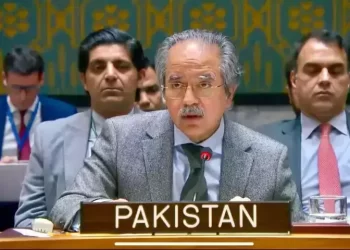The decision by Harvard to delay degrees for 13 students for one year has caused outrage at the university and a mass walkout from its graduation ceremony.
More than two weeks have passed since the graduates’ commencement ceremony for 2024 at Harvard University, but Asmer Asrar Safi is still waiting to receive the degree for which he spent four years studying.
“The situation remains as is, unfortunately,” he tells media from Boston, United States.
Besides Safi, who is originally from Lahore, Pakistan, another 12 students find themselves in the same situation: they are all graduating students at one of the most prestigious educational institutions in the world but will not be awarded their degrees for at least one year.
Harvard Corporation, the university’s top governing body, barred these students from receiving their degrees during this year’s graduation ceremony on May 23 on account of their involvement in the three-week pro-Palestine encampment at the university last month.
“I am waiting for my appeals decision to come out,” 23-year-old Safi, an international student of social studies and ethnicity, migration and rights at Harvard College, says.
“I am a Rhodes Scholar and trying to ascertain if I can matriculate at the University of Oxford given that my Harvard degree has been withheld for a year, even though I have met all the academic conditions for my programme and have completed my degree requirements.”
Shraddha Joshi is another student who will not be able to receive her degree, despite having the backing of her faculty at Harvard College, where she was studying in the same programme as Safi.
“After having completed the appeal application on my end, we seem to be in a limbo as we wait for communication from the university. Students and faculty members are all quite confused by the ambiguity of the process, and the timeline for appeals is unclear,” she told media.
Like many other academic institutions in the US, Harvard University has found itself caught up in an increasingly angry debate about academic freedom and the right to protest over Israel’s ongoing war in Gaza.
Having served as Harvard’s president for just six months, Claudine Gay resigned from the position in January this year, following her appearance at a congressional testimony about “rising anti-Semitism” on the college campus in December 2023.
In her resignation letter, Gay, the university’s first Black president and only the second woman to take the role in its 388-year history, cited personal attacks “fuelled by racial animus”.
Her resignation came following pressure on her to step down as she also faced allegations of plagiarism about her academic work which surfaced soon after the congressional hearing.
In April, students at Columbia University, an Ivy League college in New York, began an encampment on their campus grounds in protest against the Israeli war on Gaza. They demanded that their university divest from companies linked to or doing business with Israel.
Academic freedom and the right to protest
The protest movement grew rapidly across the country, with encampments appearing at more than 30 other universities, including Harvard, where the student protest encampment began on April 24.
The demand by students at the Harvard encampment, much like the rest of the college campuses in the US, was for a full disclosure of Harvard’s investments in companies linked to Israel and divestment from those companies.
On May 14, Harvard interim president Alan Garber said: “With the disruption to the educational environment caused by the encampment now abated, I will ask that the schools promptly initiate applicable reinstatement proceedings for all individuals who have been placed on involuntary leaves of absence. I will also ask disciplinary boards within each school to evaluate expeditiously, according to their existing practices and precedents, the cases of those who participated in the encampment.”
The protesting students accepted this outcome and decided to disband the encampment.
“As the protest tactic exhausted its utility, we realised that it was best to shift gears and move forward with organising along different lines,” says Safi. “Yet, while we stuck to our half of the agreement, the university did not and continued to discipline all of us in unprecedented ways.”
Joshi, who was not a camper herself but acted as a liaison with the college administration on behalf of the protesters, was among the group of more than 20 students who were placed on “involuntary leave” and asked to leave the Harvard campus.
Despite the university’s promise to begin reinstating those students, however, she says: “On May 17, I was told verbally that Harvard’s administrative board had chosen to place me on probation until May 2025, withholding my degree until then. This decision was confirmed in writing on Monday, May 20, affecting myself and 12 others.”
When media asked Harvard University to explain this decision, a spokesman said: “I will refer you to President Garber’s communication written to the representatives of those participating in the encampment. It does not speak to the outcome of disciplinary processes, rather it indicates he would encourage disciplinary bodies to move their processes forward expeditiously, in line with their existing precedents and practices.”
Student protesters at Harvard say the emergence of the solidarity encampment on their campus was not an “isolated event”.
There had been numerous vigils, awareness campaigns as well as protest rallies across the campus, with the pro-Palestine students organising events that were more focused on educational and cultural events, even prior to the October 7 Hamas attacks in southern Israel.
Post-October, the group’s advocacy efforts have been mostly centred on protesting against “Harvard’s complicity” in the events in Gaza.
Safi says he has been working on pro-Palestine causes at the Harvard campus since 2020, helping organise various events.
“Shraddha and I have planned various events regarding our divestment campaign, which has grown tremendously over the last few months, with students being forced to contend with the university’s complicity in the crimes committed against Palestinians,” he says.








